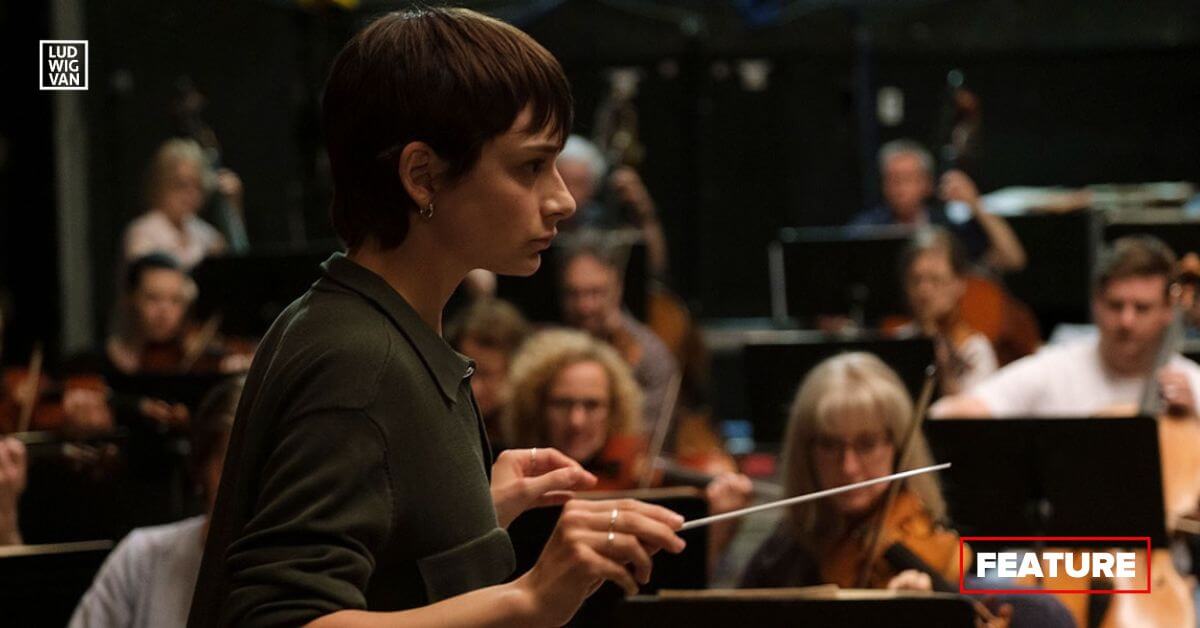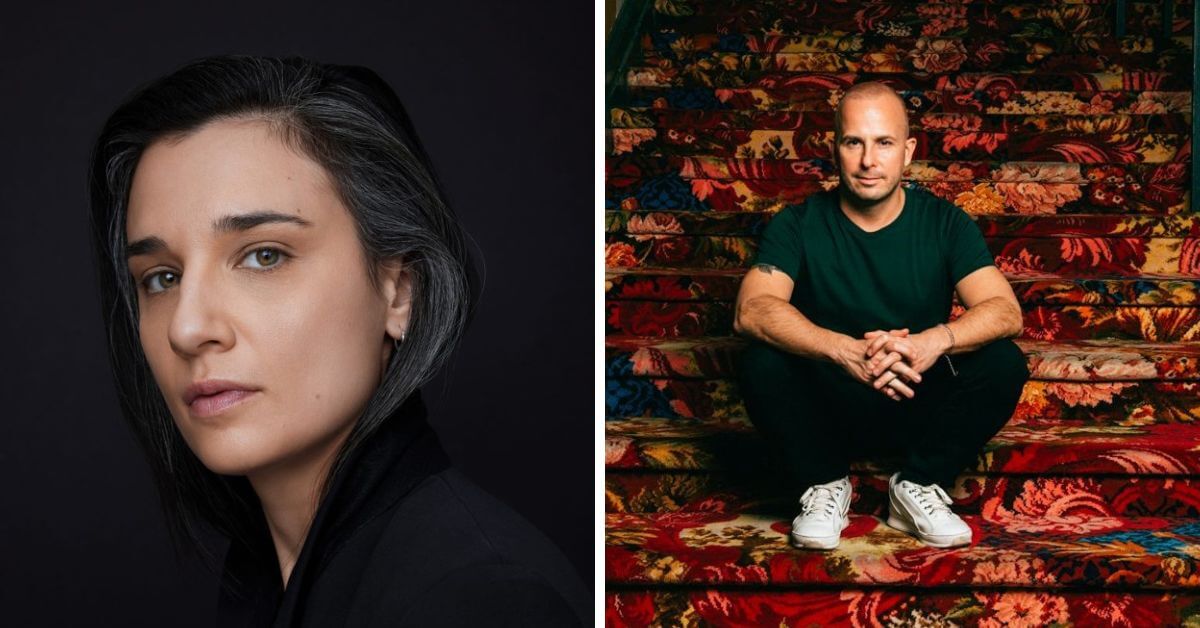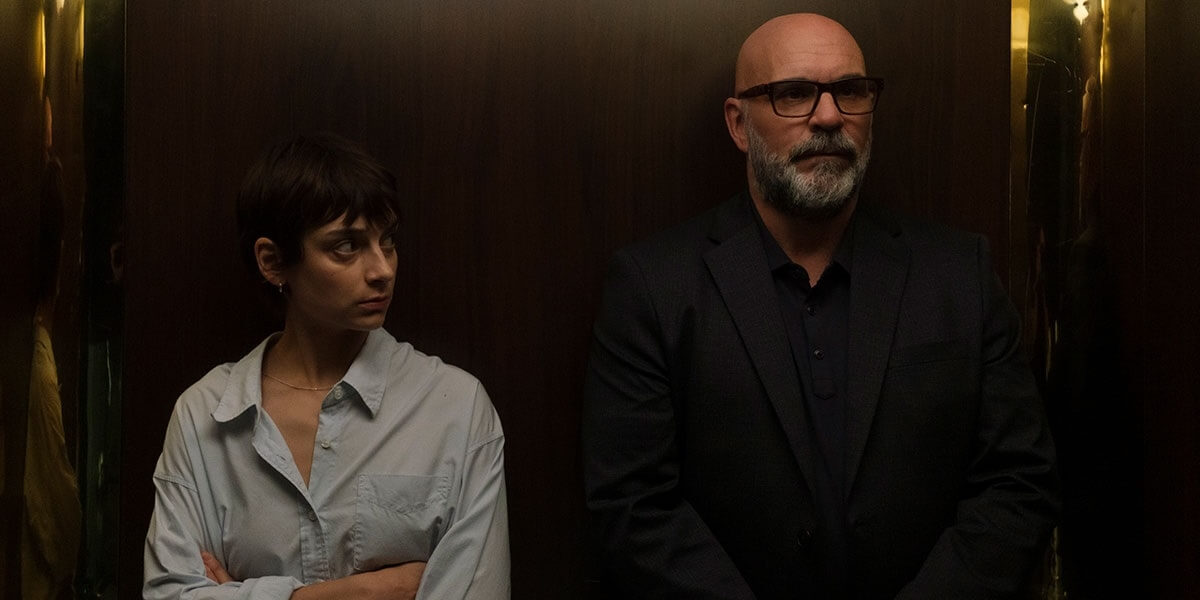
Days of Happiness/Les Jours heureux, set in Montréal’s classical music scene, saw its world premiere at the 2023 Toronto International Film Festival. Written and directed by Chloé Robichaud (Sarah Prefers to Run/Sarah préfère la course, Boundaries), conductor Yannick Nézet-Séguin worked with Robichaud to ensure that the details of the classical music world and its roles were portrayed with realism.
The Canadian film stars Sophie Desmarais as a young conductor grappling with family pressures along with those of her profession, with co-stars Sylvain Marcel, Nour Belkhiria, and Maude Guérin, and cinematography by Ariel Méthot.
The Story
The movie opens with a family scene at a lakeside cottage, one full of the kind of odd tensions common to those gatherings. Emma is alone on a float on the lake, awkwardly put in a position to ask for help. It sets the tone for an emotional character study of Emma, an emerging conductor who’s dealing with a pressure cooker of influences from all sides.
There’s her father/manager, and his overbearing and somewhat infantilizing way of dealing with her and her career. Then, there’s her girlfriend, who doesn’t seem to want/need a relationship quite as much as Emma needs the full-time emotional support.
As if those pressures weren’t enough, her conducting residency is running out with nary a contract signing in sight. Can she play her cards strategically enough to get a real chance at the next step in her career? Will Dad let her breathe as a professional with her own sensibilities?
On top of all that, can she find her own voice and vision as a conductor in a profoundly hierarchical world where listening to, and following, her mentor’s advice is non-negotiable? Penetrating the fog to find her own vision as an artist becomes Emma’s breakthrough, and her way forward.
We spoke with Chloé and Yannick about the movie and more.

The Interviews
Director Chloé Robichaud came to the world of classical music as an outsider, but a fascinated one. “I was attracted at first just about the idea of having a young female conductor on the screen.” It’s a theme and a kind of character she’s been drawn to in her other films.
“I like to have women on screen in positions that we’re not used to seeing. But, then I started doing the research, and I fell in love with the classical world, and I was like, how amazing is this classical music to tell a story?” she says. “It’s very universal — everyone can connect. It can tell a story without using words.”
Yannick Nézet-Séguin, music director of the Orchestre Métropolitain, the Metropolitan Opera, and the Philadelphia Orchestra, recently also served as consultant to Bradley Cooper in taking on the role of Leonard Bernstein in the biopic Maestro. But, his involvement with Les jours heureux goes back a couple of years or more.
“Chloé Robichaud contacted me as part of her research. She wanted to ask me questions. She said, I’m writing a scenario. I’m interested about conducting; I need to ask you a few questions. I remember the phone conversation, and of course, I knew her work,” he says.
“I thought it was intriguing, but didn’t quite know where this was going. When she officially asked me, can I go and observe rehearsals, and explained to me the scenario, I was really all in, because I thought this was a film that would showcase the art form that I love — symphonic music, classical music — but in a very emotional and true way, where music plays a role of emotional liberation. That I think is unusual.”
He notes that Hollywood seems to be taking more interest in the classical music world in general of late, including films like Tár, and Chevalier, and the emphasis now is on realism. Historically, the movie world’s favourite use of conductors and classical music in general is as as kind of stereotype or exotic milieu.
Last year’s Tár, in particular, is an obvious comparison.
“Tár came very much as a surprise for us, because Chloé has been writing her scenario for years. It always involved a woman, and it always involved a relationship with a cellist. So that was kind of eerie, to be the same,” he says, “but the movies are so different.”
As Emma, Sophie conveys much without speaking in the movie. It’s her body language that tells us her state of mind. “When I started writing the synopsis, I thought, I need Sophie for that,” Chloé says. She notes her intelligence as an actress.
“Sophie spent a good two years preparing for this role,” Yannick says. He notes that the first thing she asked him was what music theory books she should be studying. He was surprised — he assumed she’d simply be faking it. “At the end of the day it becomes more choreography than conducting, but she didn’t want to take any shortcuts. She really listened to the music, and watched a lot of videos.”
He had two collaborators for her training. “Sometimes Sophie would want three lessons a week!” he laughs.
Chloé says that the last six months were particularly intense.
“She has a very strong, what I call inner life, so she doesn’t need to have words. You just put a camera on Sophie,” she explains. “I needed that. It’s all about body language, and how the body speaks for her.”
Her demeanour changes over the course of the film, and with each piece of music she works on.
“Sophie was really good at that, at finding the nuances in the movement,” Chloé says. Sophie was naturally a little nervous at first to stand in front of the seasoned musicians of l’Orchestre Métropolitain, even in the controlled environment of rehearsals for the film. “I told her, use that, use your own nervousness.”
They shot the scenes of Mozart first, so that Sophie’s real tensions come through in character. As she progressively loosens up as an actress, the production used her real world evolution to mirror that of Emma’s in the film. “It was my priority to get that right.”

The prep shows. During the film, Emma goes through a transformation from a talented, but too uptight beginner, to someone who is beginning to come into her own.
“Those nuances took a lot of time,” Yannick says. “It’s hard enough if you are a professional to do that.”
Yannick points out that it’s not only Emma’s movements as a conductor that are realistic, but the general demeanour of the orchestra and musicians, the dynamic between conductor and orchestra. It’s a world of civility, where people are focused on working together. However, there are tensions that come to the surface. In one scene, after Emma and the orchestra perform Schoenberg, a deep-pocketed sponsor offers a passive-aggressive critique of her choice — not a crowd favourite. That, too, is realistic.
“I think it’s showing also how this field is evolving at the moment,” he adds. “It’s showing that it’s at least possible to be a young woman, a lesbian, on the podium, and people are accepting of that.” In the story, Emma’s relationship with her girlfriend is treated as matter of fact. “Not so long ago, that would have been groundbreaking.”
It was Chloé’s dedication to presenting the world of classical music in its true form that drew him in. “It was that commitment to realism was kind of a condition for me to say yes to this film,” he says.
Yannick conducts the Orchestre Métropolitain in the film during the concert scenes. However, he says the musicians did play for Sophie during the rehearsal scenes. “They’re playing for real — they’re not air playing,” he says.
For Chloé, the music is intertwined with the story. “Just the music is a character in the film in itself, and it’s telling the journey of Emma,” she explains.
The movie’s sections are named after the composer Emma and the orchestra are tackling in the ensuing scenes: Mozart, Schoenberg, and Mahler. “It felt like chapters of her journey. It’s to mark also, just like a symphony, the movements,” says Chloé.
Chloé changed her approach visually for each to reflect Emma’s evolution through the process. For Mozart, the scenes are well lit. “The way I frame it, the way I edit it, is more, I would say, classical. Technical,” she says.
“When we arrive at the Schoenberg, we go to much more darker areas of my direction. Even the lighting, and the way I frame, is more expressionist. There is even, well Schoenberg is about dissonance, and the lenses I use are dissonant. I go from long lens to white lens; it’s not something that you usually do. And then the Mahler, it was just connecting to the Mahler and the emotion of the music. The camera is flowing with the character at that point.”
The pressure cooker environment that Emma faces in the movie is all too realistic for a young artist. “It completely is,” Yannick confirms. Emma finds her strength and her voice through the music.
The emphasis on the healing power of music is another aspect that drew Yannick to the project. “That’s why I’m very happy about it.” How Emma interprets the music is also part of her own emotional state and development.
He points out that changes in the classical music world, reflected in the film, also echo those of the larger world. “[It’s] how our society is reassessing now what it is to be a leader, and how vulnerability has to take a role,” he explains. “I try to teach young conductors that it’s a lifelong thing, you know, you’re never quite there. But, I try to teach that you need to accept your vulnerability, and that everything you’re feeling inside is reflected in the music making.”
Classical music may be having its moment in the movies right now. “I don’t know why this is happening,” Yannick says, “but I know that for our art form, it’s a great opportunity to just defuse to everyone what we believe in.”
Let’s hope it lasts.
The film will be presented in an event screening at Théâtre Maisonneuve in the Place des Arts on October 16, with Yannick Nézet-Séguin and l’Orchestre Métropolitain in attendance. Les jours heureux will then go into general theatrical release on October 20 in Québec, and a bit later in the rest of Canada.
#LUDWIGVAN
Get the daily arts news straight to your inbox.
Sign up for the Ludwig van Daily — classical music and opera in five minutes or less HERE.
- INTERVIEW | Composer Ari Kinarthy And Director Jeff Lee Petry Talk About Ari’s Theme, Premiering At Hot Docs - April 26, 2024
- PREVIEW | Creators & Performers Natalya Gennadi And Kristine Dandavino Talk About Grandma’s Shawl - April 26, 2024
- PREVIEW | Artistic Director Emily Cheung Dives Into Little Pear Garden Dance Company’s History & 30th Anniversary Peformance - April 26, 2024



